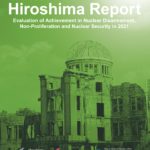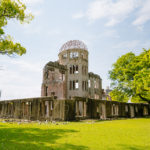Column 5 Prospect for the Future of the NPT Regime: With an Eye to the Review Process Starting in 2020
by Nobumasa Akiyama
The year 2020 marks the 50th anniversary of the entry into force of the Nuclear Non-Proliferation Treaty (NPT). The Review Conference at the anniversary will be held amid an unprecedented sense of crisis.
The previous Review Conference five years ago was plagued with sharp divide over nuclear disarmament and the Middle East zone free of weapons of mass destruction. Since then, there has been no convergence of discussions. Therefore, it is probably impossible to adopt a final document with substantive content that includes review and assessment of the implementation of the Treaty centered on its three pillars of nuclear disarmament, non-proliferation and the peaceful use of nuclear energy.
In the meantime, while the international community becomes increasingly divided over nuclear disarmament, the Treaty on the Prohibition of Nuclear Weapons (TPNW) will enter into force soon. If the forthcoming NPT Review Conference fails to produce any
achievement, some member states of the TPNW may shift the platform for their movement for nuclear disarmament to the TPNW from the NPT. In such a case, while there remain doubts as to the effectiveness of encouraging nuclear disarmament through the TPNW, which does not include any nuclear powers, there are concerns that the confidence of the international community on the NPT as a cornerstone of the international order for nuclear non-proliferation will decline.
The NPT provides a basis and normative legitimacy for the design of various nuclear non-proliferation regimes, including IAEA safeguards and export controls. The current export control regimes are designed to regulate the supply-side to prevent the spread of nuclear-related technologies that could lead to the development of nuclear weapons. However, as the threshold for acquiring sensitive technology lowers, the current relationship between “supply- side” and “demand-side” will change in amanner to change such an assumption to design the effectiveness of an export control system. In order to continue to control nuclear risk to a low level, it is not enough to rely solely on the implementation of rules and regulations under the non-proliferation regime and enforcement power to ensure such implementation. And it will become even more important for each country to make a continuous and voluntary commitment to the non-proliferation regime. Such commitments may be basically interpreted as those to the NPT itself.
If the forthcoming NPT Review Conference is seen as a failure by the majority of the international community, and many of the member states have given up the realization of universal values (the reduction of nuclear risk and the ultimate elimination of nuclear weapons) through the NPT, then commitments to the NPT will decline, hindering not only nuclear disarmament but also the implementation of policies for nuclear non-proliferation. This is why, despite the fact that NPT is a nuclear “non-proliferation” treaty, the “three pillars,” which include nuclear disarmament and the peaceful use of nuclear energy as well as non- proliferation, are recognized as the cornerstone of the treaty.
In order to avoid such an awkward situation, at minimum, this Review Conference should aim at: 1) producing some tangible result in which all NPT member states show a renewed strong commitment (possibly as a high-level political statement) to the grand bargain of the NPT, including nuclear disarmament and the peaceful use of nuclear energy, in addition to nuclear non-proliferation; and 2) identifying
concrete issues/agenda for consideration that will enable substantive, forward- looking discussion on nuclear disarmament and nuclear non- proliferation during the next Review Cycle until 2025, the 80th anniversary of the first dropping of an atomic bomb.
Professor Nobumasa Akiyama, Dean of School of International and Public Policy, Hitotsubashi University








